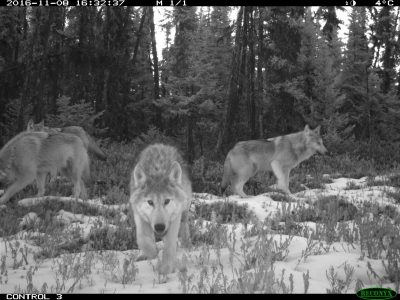Introduction to Camera Trap Data Management and Analysis in R
- Start Date: January 22, 2025
- End Date: January 24, 2025
- Time: Varies, see schedule
- City: Revelstoke BC
- Venue: Revelstoke's Okanagan College: 1401 1 St W
- Instructor: Dr. Chris Beirne
- Be sure to review the contingency plan for this winter course
Course Description
 The number of projects employing camera traps to understand ecological phenomena is growing rapidly – as are the number of statistical tools to analyze the resultant data. Consequently, the management and analysis of camera trap data can seem complex and overwhelming. This course aims to guide participants in effective ways to store, manipulate and analyze camera trap data within the R statistical environment.
The number of projects employing camera traps to understand ecological phenomena is growing rapidly – as are the number of statistical tools to analyze the resultant data. Consequently, the management and analysis of camera trap data can seem complex and overwhelming. This course aims to guide participants in effective ways to store, manipulate and analyze camera trap data within the R statistical environment.
It will cover data storage and exploration of best practices, introductions to the major methods used to analyze camera trap data, all using real world camera data. The course will give participants the tools to manage, analyze and share camera trap data in an approachable and practical way!
This course is designed for students who are familiar with the basics of using R and R Studio.
Course Schedule:
Wed, Jan 22, 2025: 9am – 4pm
Thu, Jan 23, 2025: 8:30am – 4pm
Fri, Jan 24, 2025: 8:30am – 3pm
**In the event road closures make travel to Revelstoke impossible on January 21st due to highway closures for avalaneche control, this course will commence one day later. Registrants must incorporate this into their planning. See related notes on winter contingency plans below.**
Course objectives
The following course objectives have informed the course itinerary – a copy of this detailed outline is available upon request:
- Introduce camera trap data standards and formatting
- Explain basic pre-processing workflows
- Introduce common routines for checking the quality of camera data and dealing with commonly encountered errors in real world data
- Give participant hands-on experience in using camera trap data to quantify:
- community composition
- single species habitat-use
- multi-species habitat-use
- density
- activity patterns
- Discuss when and where other analytical approaches not covered by the course may be appropriate (e.g. occupancy, behaviour, species distribution, and structural equation models) and provide resources for further study
- Discuss the WildCAM initiative and other synthesis projects
Our instructor
 Christopher Beirne has worked with camera traps for over a decade in North America, South America and Africa resulting in multiple scientific publications and technical reports. He has been using R on a near daily basis since 2011. He is currently a Senior Scientist at Osa Conservation, an affiliated researcher in the Wildlife Coexistance Lab at UBC and a member of Camera Trap Network for Western Canada (WildCAM).
Christopher Beirne has worked with camera traps for over a decade in North America, South America and Africa resulting in multiple scientific publications and technical reports. He has been using R on a near daily basis since 2011. He is currently a Senior Scientist at Osa Conservation, an affiliated researcher in the Wildlife Coexistance Lab at UBC and a member of Camera Trap Network for Western Canada (WildCAM).
For those of you who attended our popular conference, Scaling Up Camera Trap Surveys to Inform Regional Wildlife Conservation, you’ll remember Chris as the lead facilitator for the workshop on how to perform robust exploration and analysis in R with camera trap data. Chris is also well known in CMI circles for his popular CREDtalk (season 5), which we recommend you watch prior to this course.
Who should take this course?
This course will be of interest to undergraduates, graduates, wildlife professionals, regional biologists, and interested communities/organizations in camera trapping methods and analysis.
Prerequisites, preparation and what to bring
This course is designed for students who are familiar with the basics of using R and R Studio. Experience with importing and exporting datasets, using “data frame” objects, and making basic plots (e.g. scatter plots and boxplots) will be beneficial. That said, all code will be provided and reproducible, so even students with minimal R experience will get a lot from the course!
Example camera trap data and course materials will be provided two weeks before the course start date.
Please come prepared to the course with:
- Laptop with the following programs installed
- R: https://www.r-project.org/
- R Studio Desktop: https://www.rstudio.com/products/rstudio/
- External monitor and mouse – not mandatory but you are welcome to bring these things. You’ll have enough space to set them up.
- If participant have their own data, they should format it into the Wildlife Insights metadata standard format.
- *Optional but highly recommended* Watch Chris’ previous seminar delivered in season 5 of CMI’s CREDtalks. You can find that here
What is included with this course?
- Instruction, course manual, and other course materials
- Reproducible code to use on your own projects
- Coffee breaks with snacks!
- Participants will have the option of purchasing bagged lunches upon registration. If they choose not to, we suggest you bring your own lunch as there are limited options for quick lunches near the college where the course will take place
Winter contingency plans
We get many requests to hold our courses in the winter, we are based in Revelstoke after all!  However, one of the winter realities of the Revelstoke area is that with a lot of snow comes the increased possibility of road closures. As such, the following contingency plan is in place: In the event that road closures make travel to Revelstoke impossible on January 21st due to highway closures for avalaneche control or other serious highway incidents, this course will commence one day later. It is very highly recommended that all registrants traveling to this course give themselves plenty of travel time to arrive safely in Revelstoke on January 21st, ready for the course to commence January 22nd. The course has been scheduled such that you can then stay in town to enjoy winter activities over the weekend after you have completed the course.
However, one of the winter realities of the Revelstoke area is that with a lot of snow comes the increased possibility of road closures. As such, the following contingency plan is in place: In the event that road closures make travel to Revelstoke impossible on January 21st due to highway closures for avalaneche control or other serious highway incidents, this course will commence one day later. It is very highly recommended that all registrants traveling to this course give themselves plenty of travel time to arrive safely in Revelstoke on January 21st, ready for the course to commence January 22nd. The course has been scheduled such that you can then stay in town to enjoy winter activities over the weekend after you have completed the course.
Note that the even if the course is delayed and starts one day later as described above, CMI’s cancellation policy still applies – when registering for this course it is assumed you are available for the contingency dates.
Registration
Member: $540
Non-member: $585
Bagged lunches $17/day, optional. Refreshments will be provided at the breaks as part of your registration fees. All food provided by La Baguette.
Limited class size, register immediately to secure your spot.
*Memberships may be purchased and renewed while you register. More about membership here.
Registration now full
When the course fills, you can request to be placed on the cancellation list – anyone on this list will have the chance of filling registration cancellations as well as being the first to be notified when we open up registration for next season’s course. Please email office@cmiae.org to be placed on the wait list.
Where to stay?
We have numerous accommidation options that offer discounts to CMI registrants:
Grizz Hotel: Affordable, right downtown Revelstoke.
- Discount of 10% off seasonal room rates, must phone to book, asking for the “CMI rate.” Phone number: 250-837-5151
- About a 20min walk to the Okanagan College building where this course starts each day
- Suggest requesting a room on second floor to avoid possible street-level noise
Basecamp Revelstoke: various locations and room rates
- Discount code of 15% via the online booking tool using the promo code “CMI”
- Basecamp Resort: Just outside of town towards Revelstoke dam. About an 8-10min drive to the classroom space at the Okanagan College
- Basecamp Suites: A brand new build downtown Revelstoke
- Northwinds Hotel: A newly acquired hotel in the Farwell area of town, just 5min from classroom space at Okanagan College. Marketed as having affordable rates. (Most affordable of the three listed here.)
Our event partners

A big thanks to the WildCAM Network for all the work they do and for supporting this course.

